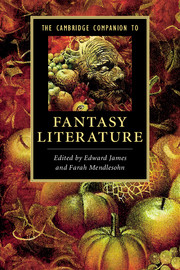Book contents
8 - Political readings
from PART II - WAYS OF READING
Published online by Cambridge University Press: 28 March 2012
Summary
All fantasy is political, even – perhaps especially – when it thinks it is not. From the abstruse literary confection to the sharecropped franchise series, a fantasy text at the very least functions like any cultural text to reproduce dominant ideology. This essay is concerned with some of the ways in which fantasy has been theorized as being political, and with the ways in which some authors have utilized fantasy for explicitly political ends. Rosemary Jackson's Fantasy: The Literature of Subversion (1981) established the association between fantasy literature and resistance to the dominant social order, arguing that fantasy ‘characteristically attempts to compensate for a lack resulting from cultural constraints: it is a literature of desire, which seeks that which is experienced as absence and loss’. Fantastical intrusions into bourgeois reality are thus seen as the return of the repressed into the realm of representation.
Jackson characterizes this in Lacanian terms: the Symbolic (the law, the signifier, subjectivity) constrains and is disturbed by the Imaginary (delusion, the signified, the Other), exhuming ‘all that needs to remain hidden if the world is to be comfortably “known”’ (65). Fantasy opens ‘for a brief moment, on to disorder, on to illegality, on to that which lies outside the law [and] dominant values systems’ and thus ‘reveals reason and reality to be arbitrary, shifting constructs and thereby scrutinizes the category of the “real”’ (4, 21). For Jackson, fantasy's subversiveness lies in its disruption of the smooth surface of the bourgeois social order as constructed in the mimetic novel.
- Type
- Chapter
- Information
- The Cambridge Companion to Fantasy Literature , pp. 102 - 112Publisher: Cambridge University PressPrint publication year: 2012
- 3
- Cited by

